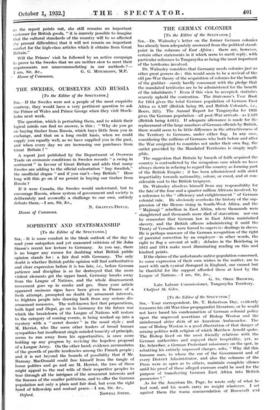THE GERMAN COLONIES
[To the Editor of the SPECTATOR.] SIR,-Dr. Walmsley's letter on the former German coloniei has already been adequately answered from the political stand- point in the columns of East Africa ; there are, however, certain other statements in it which seem to merit reply, with particular reference to Tanganyika as being the most important of the territories involved.
Dr. Walmsley considers that Germany nee& colonies just as other great powers do ; this would seem to be a revival of the old pre-War theory of the acquisition of colonies for the benefit of the grabber—surely hardly consonant with the pledge that the mandated territories are to be administered for the benefit of the inhabitants ? Even if this view be accepted, statistic's scarcely uphold the contention. The Statesman's Year Book for 1914 gives the total GerMan population of German East Africa as 4,107 (British being 90, and British Colonials, Boers, 321). The Annual Report for Tanganyika for 1931 gives the 'German population—all post-War arrivals—as 2,139 (British being 4,011). If adequate allowance is made for the. replacement of the large numbers of German officials by British, there would seem to be little difference in the attractiveness of the Territory to Germans, under either flag. In any case, considering the millions of Germans who both before and after the War emigrated to countries not under their own flag, the outlet provided by the Mandated Territories is simply negli- gible.
The suggestion that Britain by breach of faith acquired the country is contradicted by the scrupulous care which we have always shown in refusing to regard the country as forming part of the British Empire ; it has been administered with strict impartiality towards nationality, colour, or creed, and at con- siderable cost to the British taxpayer.
Dr. Walmsley absolves himself from any responsibility for the fate:of the four and a quarter million Africans involved, by a reference to the " efficiency and enlightenment " of German colonial rule. He obviously overlooks the history of the sup- pression of the Herero rising in South-West Africa, and the " Mantuan " rebellion in East Africa, where thousands were slaughtered and thousands more died of starvation; nor can he remember that German law in East Africa maintained slavery, and the British officers administering it until the Treaty of Versailles were forced to supervise dealings in slaves. He is perhaps unaware of the German recognition of the right of parental correction by an employer—in other words, the right to flog a servant at will ; debates in the Reichstag in 1913 and 1914 make most illuminating reading on this and kindred points.
If the claims of the unfortunate native population concerned, to some expression of their own wishes in the matter, are to meet with such cynical disregard in England, one cannot but be thankful for the support afforded them at least by the League of Nations.—I am, Sir, &c.,
G. ST. ORDE BROWNE, Late Labour ComMissioner, Tanganyika Territory. Chalfont St. Giles.














































 Previous page
Previous page